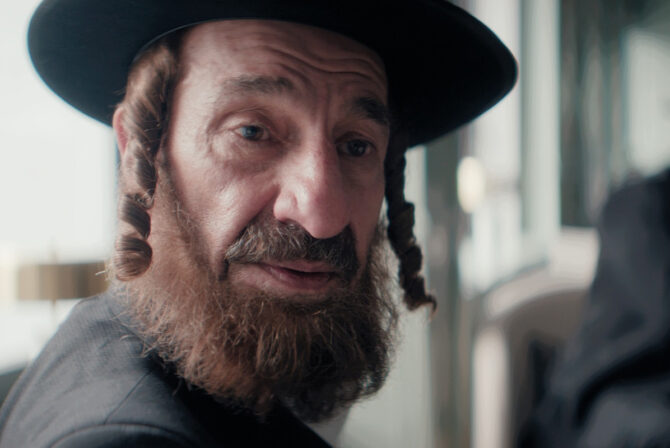When my late husband Peter was a teenager, his mom stumbled upon a box with leather straps in his closet. Disturbed over her discovery, she raced downstairs to address him. He explained it was tefillin (phylacteries). Around the same time, he started keeping kosher, taking countless trips to Israel, and dating more observant women.
Eventually, I came along. I’m a cultural Jew who spits out fakakta and kvetch in everyday conversations, but I’m hardly practicing. Once we moved in together, I gave into the kosher kitchen, but I wasn’t happy about it. I was a vegetarian, and many of my go-to veggie staples didn’t have a kosher hechsher. It took a few years—and a lot of nagging—until we comprised and allowed certain vegetarian food that had yet to be blessed into our fridge.
For well over a decade, we happily balanced our Jewish life. At times it was hard, and I’ll confess that I did consider chugging a bottle of Manischewitz wine as I cowered in the corner during my son’s bris. Yet I felt utter happiness when I saw the proud look on Peter’s face as we welcomed our son into the world during this traditional ceremony. When our kids were older, we enrolled both in Hebrew School, Peter hosted family seders, and we occasionally did Shabbat dinner.
When my children were 8 and 5, Peter passed away. In the weeks that followed, I was a devastated shell-shocked young widow drowning in grief. Friends came over to cook dinner and alerted me that my range didn’t work. When I walked over to the stove, I looked in the pan and spotted shrimp.
Had I not told them we were kosher? Was Peter so annoyed that shellfish tainted his favorite pan that he blew out the pilot light from beyond? I immediately regretted expressing such an insane thought. My friends claimed if Peter were alive, he’d laugh about this. I assured them he definitely wouldn’t. Then I handed them a lighter.
The next morning, I ditched the second set of dishes, and in the evening I served the kids meatballs and spaghetti covered in Parmesan cheese. There was a sense of guilt as I sprinkled on the first bit of cheese, but I told myself that Peter and I both grew up eating cheeseburgers, and as adults we reached our own religious decisions and identity. I respected his when we were together, but they were never mine.
Years have passed, but within the last few months, as I cook my assortment of non-kosher meals, there is a perpetual hum of Haftorah or Hamilton heard in my apartment. In the next few weeks, my daughter will become a bat mitzvah. We will sit through a two and half hour service in Hebrew in a Conservative temple Peter had chosen, and where I still feel like an outsider. How we stuck it out as members, at the High Holidays and Purim celebrations, is a sign that I must have wanted Peter’s beliefs to be apart of our children’s.
Yet no matter how much kosher food I’d ingested during my decade long marriage, I never truly swallowed the idea of religion. Newly widowed and grieving, I couldn’t imagine eating bagels, covering mirrors, sitting on wooden chairs, and making small talk with people I’d never invite to my apartment under any other circumstances, so I opted not to have a shiva. The ritual seemed like torture.
I did, however, decide to throw a bat mitzvah for my daughter. After the service, we will feast at a kosher Kiddush, where I will most likely tastelessly complain to guests that it cost me three times as much to cater this kosher Kiddush than a non-kosher one. When my Reform friends confess what they paid for their spread, I always remind myself that my anger is not about the money, but with myself for never feeling anything when I enter our temple or when dining on kosher cuisine. It bothers me that religion meant so much to my husband, while all I focus on is the overpriced smoked fish and the fact that Reform services are much shorter and easier to understand.
Although I don’t feel any emotion other than boredom and alienation at Conservative or Orthodox services, I know that after all of these years of practicing Judaism for my family, something deeper has permeated through my layer of disbelief. On a recent short trip to Paris, I surprised myself when I asked my mother and kids if they’d go to the Musée d’Art et d’Histoire du Judaïsme, when there was so many other sights we hadn’t seen and might never have time to visit.
Young men in military fatigues toting machine guns patrolled the street corner as well as another couple of soldiers guarding the door. We had to walk by armed guards—security that could rival any airport—just to get into this museum, and within seconds we were confronted with cards that told the brief lives of many French Jews in the 1940s.
I didn’t want to feel closer to Judaism because of the shared vulnerability of anti-Semitism. I wanted to be inspired, to fall in love with the practice, not to play out Sophie’s Choice in my head as I led my kids through the museum. Too distracted to think, I found myself watching my children more than the exhibits, as they talked about the significance of all the ceremonial objects.
Afterwards, we stopped in a falafel shop the woman working at the museum suggested, just a few blocks away. Although there was a Star of David on the door, I’m not sure the food was kosher. The waitress spoke Hebrew to her coworker as I squirted tahini on my sandwich.
As I watched my kids eat, I thought about what Peter would think about how I’ve kept Judaism a part of our children’s lives. I know I’m not devout, but there was a consistency to our practice. Perhaps eating a (possibly kosher) falafel in Le Marais wasn’t as impactful as maintaining a kosher kitchen—but I will admit that after gorging myself on too many meals of rich butter-ridden French food, the falafel, fried and familiar, made me feel at home after the first bite.
Read More:
My Jewishness Is Not Defined by My Faith in God, But This Instead
7 Female Celebrities You Probably Didn’t Know Are Jewish
Yes, I’m a Rabbi And I’m a Lesbian







